First, a huge thanks to everyone who supported the Pigeon Palace effort. It seems that we are going to be able to stay here in our home on Folsom Street in San Francisco permanently! There are some final hurdles to overcome, but it’s looking pretty solid at the moment. By the end of summer we should be celebrating; we’ll also be dealing with organizing ourselves internally to self-manage our building, and to oversee a huge process of rehabilitation and improvement in our century-old Victorian. Our apparent victory here is already inspiring lots of other folks in San Francisco, people facing eviction as well as the thousands who are in precarious rental situations who may be able to follow this path too. We hope to be a strong source of support going forward for others to achieve similar results.
The radical class and ethnic cleansing underway in San Francisco is paralleled in many other major cities around the world competitively styling themselves neoliberal capitals. In Paris in June, I saw a city that has been gentrified for more than a century—reading David Harvey’s excellent Paris: Capital of Modernity reveals a process pursued during the Second Empire (1849-1871) by the famous urban planner Hausmann based on debt financing, spatial and social restructuring, slum clearance, road building, etc. The result was the expulsion of much of the industry that had developed in the heart of Paris, along with the new industrial working class it employed. Social classes were segregated into different districts (newly created arrondisements) while incessant rent increases fueled a great concentration of wealth and the steady impoverishment of the majority of the population. Meanwhile, new trends in merchandising (e.g., the department store), and a deliberate fostering of new fashions fueled a boom in consumerism that also stimulated the economy when it had been languishing in depression at the end of the 1840s. (It didn’t hurt that the California Gold Rush was sending lots of money into the French economy at the same time!)
Anyway, our apparent lucky “lottery win” of our home in San Francisco’s Mission District, against all odds, settles—for we few lucky ones—the terrible insecurity and uncertainty dominating most local renters’ daily lives these days. Psychologically, I can finally stop fretting about where I’m going to be, and get back to focusing on how to engage with where I am. The fact that we are part of a Land Trust means I don’t have to worry about housing values, future rent increases, or any of the usual issues that accompany either ownership or tenancy. There will be other issues to be sure, self-management is its own reward and headache (we almost jokingly put a slogan on the building “We want Headaches, Not Equity!”). But with the major fears and concerns aside, I feel my home is “enough” as it becomes a foundation from which I can pursue other interests and activities.
Maintaining our homes is one of the basic fundamentals beneath a good life. But the overarching logic of this society is focused on incessant growth, which the ideological promoters insist will eventually give everyone a good life—even though it’s perfectly apparent that the growth economy produces the opposite: a growing number of displaced and impoverished people globally, an ever wealthier few who own more and more of everything, and a planet being choked and degraded by the rapacious exploitation of every corner and every resource. For the millions working in the factories and offices of the world, work is constantly speeding up and being made more intense and taking longer (whatever happened to the 8 hour day or the 40 hour week?), while space for creativity, art, music, and self-expression, not to mention nature itself, are radically diminished.
In the past few years a new movement has emerged under the rubric of “Degrowth,” though it sounds a lot better in French or Italian where the theoreticians have done most of the writing (décroissance or descrescita… in the Italian scene, the expression has been “decrescita feliz” or happy degrowth!). A friend suggested a better term in English might be “sufficiency” which trumps the awkward negative connotations of ‘degrowth’ and also leads our thoughts into a different direction than the much co-opted term “sustainability” (which by now seems to be about sustaining growth itself!). The French words in the title of this post, ça suffit, mean “that’s enough,” and I am very interested in developing a common political discourse that focuses on “enough-ness.”
I wrote Nowtopia a while back (published in 2008 in English, 2009 in Italian, last year in Brazilian Portuguese), which set out to describe a new politics of work, based on the common experience of people taking their time and technological know-how of out the market. When they aren’t at their paid jobs making money, they are often doing hard, worthwhile, but unpaid work. This Nowtopian work often addresses the crises of planetary ecology, social anomie, and isolation in local ways, but also allows the practitioners to engage in technological and social creativity in ways that wage-labor rarely allows for. When I traveled in Italy in 2008 with my book, I met Maurizio Pallante, author of Sustainable Happiness, and a man dedicated to the new politics of Degrowth.
 Now a new book has been published in English called Degrowth: A Vocabulary for a New Era and it’s an important contribution to rethinking politics in the 21st century (full disclosure, I wrote one of the 51 short essay/definitions in the book on “Nowtopians”). This slim volume is packed with big ideas organized into 3-page essays that define the key terms, such as Commons, Conviviality, Bioeconomics, Environmental Justice, Political Ecology, Autonomy, Commodification, Emergy, Imaginary, Happiness, and much more. But the collection doesn’t shy away from the many contradictions embodied in the emerging critique of capitalist growth—in fact many of the essays in the book directly conflict with each other, which bolsters the book’s credibility and importance in my eyes. I also appreciate that the book includes forthright critics of capitalism (such as myself) and various Degrowthers who are ambivalent about markets, money, and commodities, and some who consider these aspects of today’s world unchangeable. In another article published in 2014 in Capitalism, Nature, Socialism, called “Degrowth and Demonetization: On the Limits of a Non-Capitalist Market Economy” Andreas Exner develops a pretty thorough critique of the fantasies held by many eco-inspired radicals that there is a role for money and markets in a post-capitalist world. Going back to Pierre Joseph Proudhon, the assumption that non-capitalist money and markets could exist “blooms in the discourse on regional currencies, time banks, and local exchange trading systems (LETS)… [which] is also at the core of the ‘green money’ debates.” For Exner, “only reciprocity allows democratic governance and participatory planning.”
Now a new book has been published in English called Degrowth: A Vocabulary for a New Era and it’s an important contribution to rethinking politics in the 21st century (full disclosure, I wrote one of the 51 short essay/definitions in the book on “Nowtopians”). This slim volume is packed with big ideas organized into 3-page essays that define the key terms, such as Commons, Conviviality, Bioeconomics, Environmental Justice, Political Ecology, Autonomy, Commodification, Emergy, Imaginary, Happiness, and much more. But the collection doesn’t shy away from the many contradictions embodied in the emerging critique of capitalist growth—in fact many of the essays in the book directly conflict with each other, which bolsters the book’s credibility and importance in my eyes. I also appreciate that the book includes forthright critics of capitalism (such as myself) and various Degrowthers who are ambivalent about markets, money, and commodities, and some who consider these aspects of today’s world unchangeable. In another article published in 2014 in Capitalism, Nature, Socialism, called “Degrowth and Demonetization: On the Limits of a Non-Capitalist Market Economy” Andreas Exner develops a pretty thorough critique of the fantasies held by many eco-inspired radicals that there is a role for money and markets in a post-capitalist world. Going back to Pierre Joseph Proudhon, the assumption that non-capitalist money and markets could exist “blooms in the discourse on regional currencies, time banks, and local exchange trading systems (LETS)… [which] is also at the core of the ‘green money’ debates.” For Exner, “only reciprocity allows democratic governance and participatory planning.”
The Degrowth collection is organized by the vocabulary it seeks to insert into political debates. Many of the terms don’t immediately seem familiar. Here’s a bit of “Metabolism, societal …”
To meet the requirements of socio-economic systems such as the contemporary ones in the Global North, which operate with high economic diversity, high dependency ratios (due to a rising proportion of elderly persons and a higher average age of schooling) and high percentage-wise contribution of the service sector in the economy, it is likely that more workers and more working hours will be required to maintain the current metabolic patterns of societies as fossil fuels dwindle. This points to a contradiction with the degrowth proposal, which calls for reducing work hours (worksharing). In a future scarce in energy we will have to work more, not less. (by Alevgül H. Sorman, p. 43)
Many of us attracted to a degrowth agenda are interested also in finding an approach to both reducing work and making it fully under the control of those who do it. As the previous quote makes clear, a shrinking economy imposed (as it might be) by scarce and expensive energy will require even more work to maintain our customary comforts. But seeking an economy based on a concept of “enough” or what is sufficient for a good life, might also be possible with rather less energy and less “metabolic throughput” than we are currently using.
But another essay argues that energy is always in excess of what is needed for the simple maintenance of life. Onofrio Romano, a professor in southern Italy, makes a provocative argument in his essay defining the word “Dépense” (expenditure in English):
Energy consumption consists of two parts. The first is necessary for the conservation and reproduction of life. The second is used for non-productive expenditures: luxury, mourning, war, religions, games, spectacles, the arts, perverse sexual activity. All told, these activities—qualified as dépense—are ends in themselves. Any society has an excess of energy, defined precisely as all that energy that is not needed for the mere reproduction of life. (p. 86)
Dépense is a key concept, then, for theorizing a way out of the growth society. Yet, paradoxically, it does not figure among the epistemological pillars of mainstream theories of degrowth, nor is it a source of inspiration for the movement of growth objectors. This is perhaps because truly embracing dépense would entail the dismantling of a cognitive frame of catastrophe and scarcity that is at the basis of the degrowth paradigm. (p 88)
The theory of degrowth risks to reanimate and give new momentum to the basic precept of economics, that is, the principle of scarcity. It risks mirroring the myth of growth by using the same imaginary from a reversed viewpoint, an imaginary that entails the employment of all the energy in circulation for the preservation of existence, this time round by means of “virtuous” lifestyles and efficient techniques. (p. 89)
A deeper problem that the book opens with is the banal utilitarianism that underlies so much of society’s deeper assumptions. In “Anti-utilitarianism” the same Romano argues
Anti-utilitarians criticize utiliarianism because it reduces the human being. The battle to be waged, they claim, should insist on the recognition of the complexity and the plurality of forms of life. Anti-utilitarianism, far from qualifying itself as anti-modern thought, aims at rediscovering the true meaning of modernity, restoring the scientific spirit against scientism, reason against rationalism, democracy against technocracy.
The kind of critical thinking this points to is obviously in short supply during the frantic clicking of our day-to-day lives dominated by social media, channel surfing, and either lengthy bouts of intense employment, or lengthy bouts of arduously insecure unemployment. All too many of our contemporaries, even those inspired by Nowtopia and its parallels, fall back on voluntaristic simple living formulas as the best we can hope for. In another important contribution to the Degrowth book, Blake Alcott takes on the concept known as “Jevon’s Paradox (Rebound Effect)”:
… it is only with high uncertainty that one can claim real savings through technological efficiency, and it is tempting to turn to the alternative strategy of living more ‘sufficiently’—working, producing, and consuming less. Here too, though, there is rebound: if I unilaterally decide to buy less energy, my evaporated demand lowers energy’s price by an increment in the world-wide energy market. This in turn enables the world’s billions of ‘marginal consumers,’ who wish to work as much as usual and consume more output, to demand what I no longer demand. This might contribute to equitable consumption, but not to energy conservation. Unless the entire world population starts living more sufficiently, which is immoral since billions live in involuntary poverty, other people take up the slack in demand left by those who voluntarily ‘do without’ some energy. Rebound is relevant to degrowth because what must degrow down to sustainable size is not utility, happiness or even necessarily GDP, but rather the amount of bio-physical throughput caused by humans—the total amount of natural resources consumed plus the emissions and waste caused by this consumption. (p. 123)
What I enjoyed most about this collection was being regularly challenged to rethink my own glib assumptions. Operating (as we all do) within the context of my own daily life, it’s quite easy to miss things that are already embedded so deeply that we take them for granted. Ivan Illich was probably one of the best critics of this and he is invoked by Marco Deriu’s definition of “Conviviality”:
Even with more eco-efficient products, Illich points out, an affluent society generates, through radical monopoly, the paralysis of its people and eliminates their autonomy: ‘This radical monopoly would accompany high-speed traffic even if motors were powered by sunshine and vehicles were spun of air’ (Illich, 1978:73)… One detects a connection here with the theme of alienation in Marx. But the alienation that Illich describes does not depend on the ownership of the means of production. It is not an issue of property or redistribution, but of the inherent logic embedded in the instrument. Certain tools are inherently destructive, maintains Illich, no matter who owns and uses them. According to Illich, some tools are designed to produce new demands and new forms of slavery so as to make an industrial society an intensive market economy indispensable. (p. 80)
We rarely stop to consider what might be “enough,” and instead operate as though all or most of the stuff we consume is somehow necessary and indispensible. I dislike anti-consumerist politics that play the blame game, or try to shame people into consuming less. Not just because it doesn’t work (as noted in some of the above excerpts) but because shame and guilt are terrible ways to shape a political movement of emancipation. I have always felt that so many people are so convinced that they don’t “have enough” that it’s better to start a radical opening with the notion that we should ALL have EVERYTHING, and that we could do this if we reorganized work, production, and distribution. Were we to embark on such a process we would have to take into account the actual limits of how much we want to work (not so much), and what the ecological consequences actually are of various types of production and distribution. Once everything is put before a genuinely democratic polity, together we could decide that given our desire to work less and save the planet’s ecology, we could actually live with quite a bit less of the stuff we now clutter our lives with unthinkingly. I’m interested in these kinds of questions finding their way into a political process that is radically more horizontalist, anti-authoritarian, and open than anything we can find in the world today. But it turns out that those principles are the animating logic inside a great deal of the grassroots political activism taking place these days.  In another important book I read recently, Chris Dixon does a fascinating job of examining emergent politics in Another Politics: Talking Across today’s Transformative Movements.
In another important book I read recently, Chris Dixon does a fascinating job of examining emergent politics in Another Politics: Talking Across today’s Transformative Movements.
Dixon traveled around interviewing lots of activists and visiting with on-the-ground projects in Quebec, the east coast, and the SF Bay Area. He has drawn from the many interviews he did (and his own engagement with these movements) an understanding of underlying principles that cross a lot of disparate efforts, and he has usefully tried to draw lessons from the modest successes and frequent failures of radical politics in our era. There are dozens of insightful analyses in his book, and I highly recommend it. Here’s one that caught my eye since I’ve been in this kind of conversation so many times:
One result of this fixation on principles over plans is that activists often spend a lot of time and energy debating whether particular individuals, activities, or organizations are sufficiently “radical” without asking basic questions about how they seek to move us toward actually winning. A focus on political ideas and rhetoric, in this way, eclipses strategic thinking. It also creates a context in which some activists are quick to dismiss any effort—often sloppily using the terms “liberal” and “reformist”—that doesn’t lead directly to the complete destruction of the existing social order. (p. 112)
I identify pretty strongly with a lot of the logic Dixon is describing. From my Processed World days in the 1980s and early 1990s, to Critical Mass’s vital first five years, to the ongoing efforts to produce a radical historical sensibility via Shaping San Francisco, I’ve done my best to keep an “anti-authoritarian” orientation. Dixon describes well how this leads to a focus on the actual human connections at the root of political projects (if done right):
…in order to fully understand anti-authoritarian organizing, we need to turn to the feature that I think most clearly brings together an organizing orientation and prefigurative praxis. This is what I call “noninstrumental organizing,” by which I mean an organizing approach that aims to build relationships with people as collaborators in struggle rather than as instruments to achieve already determined ends. This approach is about relating to people as dignified subjects who are capable of critically analyzing the world, crafting sophisticated strategies for fighting against injustice, taking courageous risks in struggle, and envisioning a better society. It’s also about understanding organizing as a collective process through which we develop new ideas, new relations, new practices, and new questions. (p. 167)
In the special 20th anniversary issue of Processed World we published in 2001 I wrote about some of the issues Dixon takes up in his book. Leadership is a gnarly topic among anti-authoritarians, who all too often have an underdeveloped sense of the concept, leading to knee-jerk reactions to behaviors in groups that aren’t actually oppressive or even problematic but look like “leadership.” Dixon spends a long chapter on unpacking this fraught topic and concludes with some lessons drawn from the African-American organizer Ella Baker:
The radical wing of the women’s liberation movement built on this critique as it challenged the prevailing masculinized leadership in the New Left. This radical feminist perspective tended toward a general rejection of leaders and leadership as inherently oppressive. From the 1970s into the present, this stance against leadership has become linked with anti-authoritarian politics through the nonviolent direct action movement, radical queer organizing, direct action environmentalism, the global justice movement, and, most recently, the occupy movement. Anarchists, in particular, have come to identify with this understanding of leadership as basically a thinly veiled form of manipulation and domination. Today, many anti-authoritarians take this stance for granted… (p. 178) … three types of leadership and associated activities: “as facilitator, creating processes and methods for others to express themselves and make decisions; as coordinator, creating events, situations, and dynamics that build and strengthen collective efforts; and as teacher/educator, working with others to develop their own sense of power, capacity to organize and analyze, visions of liberation, and an ability to act in the world for justice.” To these we might add at least one other type of leadership: the leader as nurturer, caring for people sustaining relationships, and keeping our groups and movements healthy and functional. As we identify these kinds of roles and activities, we can begin to demystify leadership and discuss it more clearly… (p. 187) … Although we often call ourselves nonhierarchical, do leadership roles—facilitation, coordination, education, and others—necessarily involve some kind of hierarchy? And if so, can there such a thing as anti-authoritarian hierarchy? These are thorny issues, but ones we may well have to resolve if we truly want to be clear, conscious and collective about leadership. (p. 197)
In another lengthy section Dixon takes on the always difficult question of organization building, targeting political parties as one of the forms that is best left behind for good. But he doesn’t want to throw out all the people attracted to party building as dupes and authoritarians, preferring to find out why people want to build revolutionary parties and try to learn from those efforts to “develop intentional spaces, structures, and strategies for planning and carrying out long-term, coordinated revolutionary activity that can potentially involve millions of people.”
Ultimately I found Dixon’s book a surprising companion to my reading of Degrowth. Where Degrowth is written mostly by intellectuals and seems pretty far from day-to-day organizing, Dixon is fully focused on political organizing but lacks that larger critique of the deeper logic of the growth-obsessed capitalist society (not that he wouldn’t agree with such a critique). His focus throughout his book is on:
opposing exploitation and oppression, developing new social relations and forms of social organization, linking day-to-day struggles with transformative visions, and engaging in grassroots, bottom-up organizing. Built with these principles and their related practices, this pole draws many activists and organizers who are looking to get more organized and strategic but who are ambivalent about the NGO world, critical of the various forms of party-oriented organizing, and not satisfied with radical subcultural scenes. In this understanding, another politics is the set of shared politics, practices, and sensibilities that anti-authoritarians are in the process of forging, as a still not fully coherent political pole. It’s a politics to be elaborated and refined. (p. 221)
In these two books I felt I could see the beginnings of a 21st century politics that finally breaks from a lot of the assumptions and constraints of the last century. Being 2015, with Greece, the bankruptcy of Puerto Rico, the stagnating and possibly collapsing world economy in the coming months/years, the severe ecological/climate crisis and its many manifestations (oceanic acidification, species extinction, climate chaos, etc.), the prospect of revolutionary change is daunting to say the least. But this is also the year in which Black Lives Matter, anti-police organizing, and the transgender movement have broken through and reshaped public discussions. The fact that so much grassroots activism is informed by the values Dixon describes is heartening.
Perhaps we are on the cusp of much stronger, more solidly rooted and more philosophically well-developed social movements that have the chutzpah to challenge the totality of how life is organized. Between these two books, and unfolding current events around the world, I felt I could see the elements taking shape, not yet fully emergent, but maybe closer than we think.










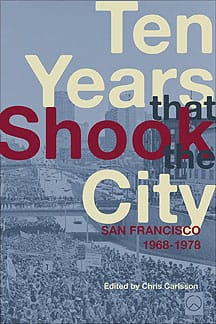

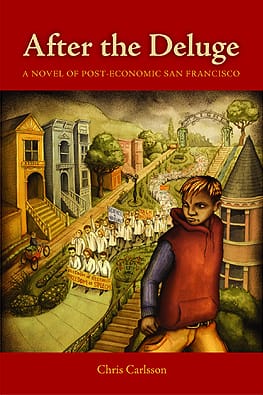
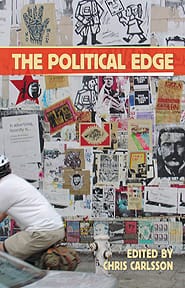
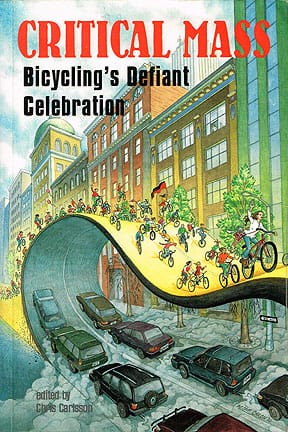

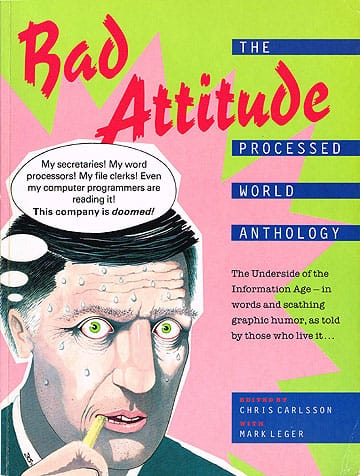

Congratulation Chris for reviewing De-Growth: A Vocabulary for a New Era. Yours may be the first review of this important book in the US. I say “important” not because I think it provides us with a roadmap (to use a discredited term) for a future society, which it doesn’t, and which the editors explicitly reject as their goal, but because it provides us with a excellent series of essays to ponder and critique that in the end will elevate the US conversation about social change beyond the rather wimpy “System Change” project.
A comments section is no place to take on the many ideas that you raise in this review, but I think one concept could be explored in some depth because it promises to be the most radical one of the lot in the book and that’s the one you highlight from Onofrio Romano – dépense. He borrows the term from a long dead French writer Georges Bataille (The Accursed Share) who used it (in English usually translated as expenditure) to denote what he saw as basic to human societies, which is the expenditure of energy. He intended this concept to overcome the reductionist view of economists who imagined societies simply as economic entities and the members of those societies as economic players – as homo faber.(www.righttobelazy.com/blog/)
Bataille utterly rejected that view based on his research into anthropological accounts. Simply stated, societies generate energy beyond that needed to meet simple survival needs and the surplus was used, in fact, to create their cultures. So the rituals and finely crafted artifacts, for instance, were expressions of this extra energy – the depense.
Looking at societies in this way provides us with a more nuanced analytic tool than the blunt instrument of economic reasoning and it affords us a more sophisticated way of imagining how our society works. The aim of course is to recognize the depravations we suffer from – a malformed depense (consumerism) and to radically reform our circumstances so that we can express our surplus energy in creative ways, both individually and socially.
However, I see a problem with this formulation: energy doesn’t simply exist, something generates it. Obviously, survival needs energy, but what creates that surplus energy? I mean, after traditional people got enough food and shelter together, they just didn’t lie about looking at the clouds. Even our ape relatives participate in all sorts of activities, ultimately, social activities beyond food gathering. So what needs are we talking about that generated cave drawings?
What I am saying is that dépense is a secondary characteristic and what is primary for human expression has still to be defined in this volume of degrowth essays. Appreciating what is missing here is crucial for cultivating the post-growth society that the contributors to this book wish to bring about. Their shared assumption being that present society, based on illusory expectations of fulfillment of the human spirit, diverts for economic ends the creativity that is inherent in our species. But too many of them, including the editors, confine their speculations to moderating that creativity in sober ways (happiness, anyone?) when what is demanded is an effervescent release of liberating energy. The kind we saw with Occupy and the kind we see now with Black Lives Matter. Need I spell it out?
Today, a NJ energy company debuted an electric car charging station network – at a large regional Mall.
Beyond contradiction – conceptual chaos.